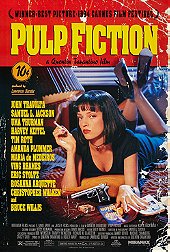Following the success of 1992's Reservoir Dogs, Quentin Tarantino released his finest film to-date, the self-proclaimed masterpiece Pulp Fiction; a film which is arguably the most influential of the last few decades, and one which stands alone as a "to-be" classic. Pulp Fiction remains widely regarded as one of the essentials in modern cinema, which has established itself as a film for the lovers of cinema, as those are the people it gets its greatest amount of admiration from.
Pulp Fiction marked the new-wave, avant-garde cinema, it became recognised for its vigorously exciting flavour and unfathomable cool. Revolving around a deconstructed narrative, composed of three stories, which are all insanely surreal, Pulp Fiction brings you inside a world Quentin Tarantino has successfully crafted through individuality. The film starts with a lavishly entertaining conversation of tension and wit between two robbers, one being Tim Roth and the other being Amanda Plummer, who kick-start the film with furious energy. This scene is then followed by the infamous conversation of Amsterdam and burgers between the justifiable "cool" of Jules (Samuel L. Jackson) and Vincent (John Travolta). From here on in you have entered a world fuelled by greed and missing-morality.
Sure, Pulp Fiction is undoubtedly one of the "coolest" and "hippest" films around, nevertheless it holds much, much more than that. The film stands as a piece which depicts the psychology of normal people who have been thrown into extreme circumstances, meaning their personalities have changed along with their situation. It is a film which is much than amusingly clever on the surface, as in fact Pulp Fiction juggles allegory, such as the "freedom" of Amsterdam being a counterpart for the film's non-conformist, disobedient nature. The film has countless recurring themes, such as redemption, vengeance, spirituality, morality, individual morals, and a person's mannerisms.
Even behind the film's humorous anecdotes there is still a lingering sense of haunting poignancy the film throws upon its viewer. The inviting environments are simply an innovative showcase for a study of one's ethics and the dealing of horrendously problematical situations. The characters are all vigorously layered, with multi-dimensional emotions and spontaneous behaviour. When I say that every actor performs with undeniable perfection, I mean it. From Christopher Walken's cameo as Captain Koons, to Bruce Willis' alpha-male, yet kind-hearted "boxer-thug" performance. Everyone in the film sets themselves a back-drop for their character, letting every character differentiate between one-an-other. Yet, as Harvey Keitel states in the film, "of course you're character, but it doesn't mean you have character".
Dense script-writing, and what might seem like entirely irrelevant dialogue lets Pulp Fiction become its own piece. And rather than being driven by plot, the film is driven by its variety of surreal characters, who all talk in a way which seems so real. Yes, the conversations may not to be the same topic you talk about with another person, but the way in which a conversation branches off to an entirely different topic is something we all do in everyday life. Few films are able to portray dialogue through such a method, which is one of the countless reasons as to why Quentin Tarantino's script is the key instinctive foundation behind the film, since it lays the rules of what is to occur in a latter scene. The script crafts the comedy, as there are no comedic set-pieces in the film, nor is there a comedic narrative. However, the actors' delivery of nerve-biting, ego-driven lines, which brim with humour and emphasised body language, gives the film its distinguished tone of dark comedy.
One of the reasons Pulp Fiction has become so iconic is due to its diversity in film-making, which is comprised of influences from French new-wave cinema, to Asian crime flicks, yet the film is still entirely original. Quentin Tarantino ultimately creates his own sense of "bravo-film-making". The use of tracking-shots, dolly-zooms, variation in lens focus, quick-cut editing, slow-motion sequences, lyrical camera positioning, steadicam tactics and close-up camera shots, the variety Pulp Fiction has is not just held within inside its narrative, but within its technical side too. Then you have the dynamic use of music, which has clearly been hand-picked by Quentin Tarantino himself and suits the film with a simplistic level of ease. The set-pieces are also crafted with scrutinising detail, such as the notorious lair, involving two hillbillies, a gimp and two of the film's protagonists.
Pulp Fiction is, quite simply, a hard-boiled, noir-toned masterpiece of modern cinema, comprised of film-making which deserves to be dissected frame-by-frame. The sheer unadulterated consistency of greatness Pulp Fiction follows means it is a film which should be watched again and again. Yes, all the characters might be "sinners", yet there is no denying that you will be rooting for a certain character(s) by the end of the film, as surely, with characters as diverse as these there must be someone you share the same belief with, right? Devine-intervention is what Pulp Fiction is, a miracle and one which justifies vast acknowledgement. Take for example Jimmy's (Quentin Tarantino) brief conversation on the "gourmet" of coffee, it sums up the magnificence of Pulp Fiction perfectly, not forgetting the addition of "lots of cream, lots of sugar".
 Login
Login